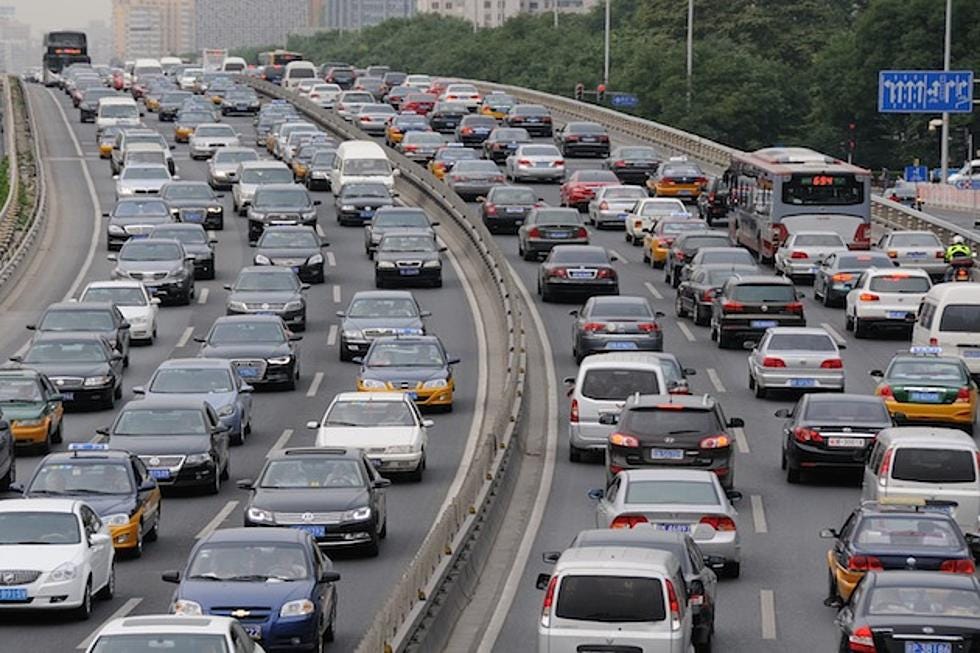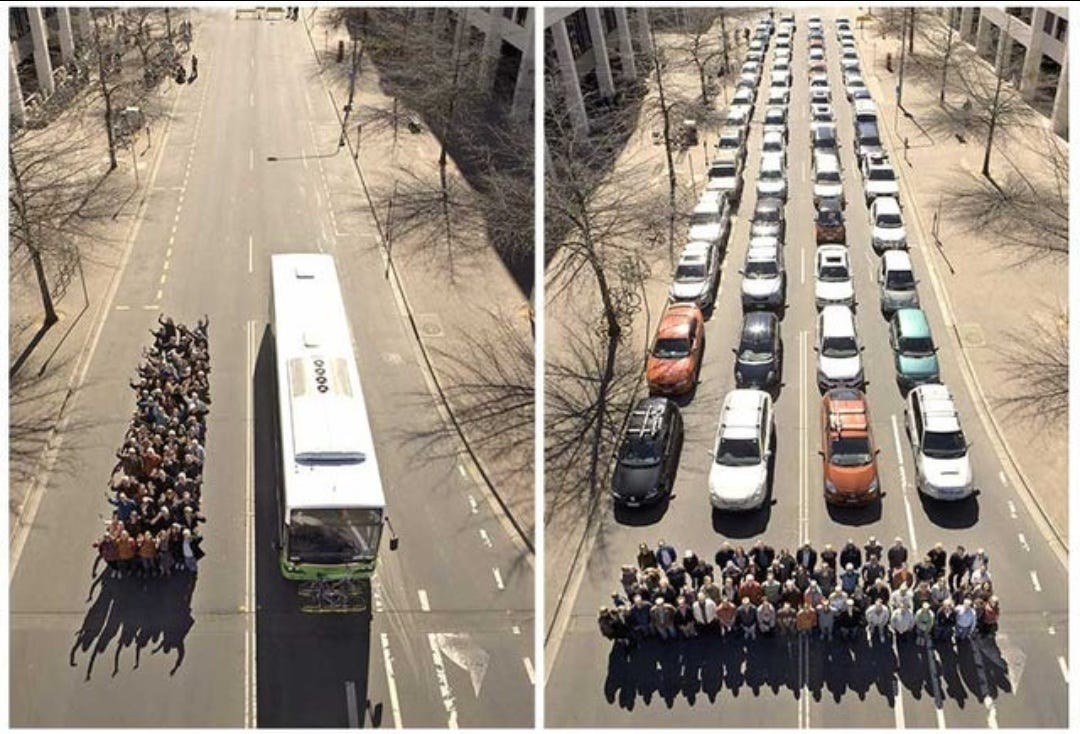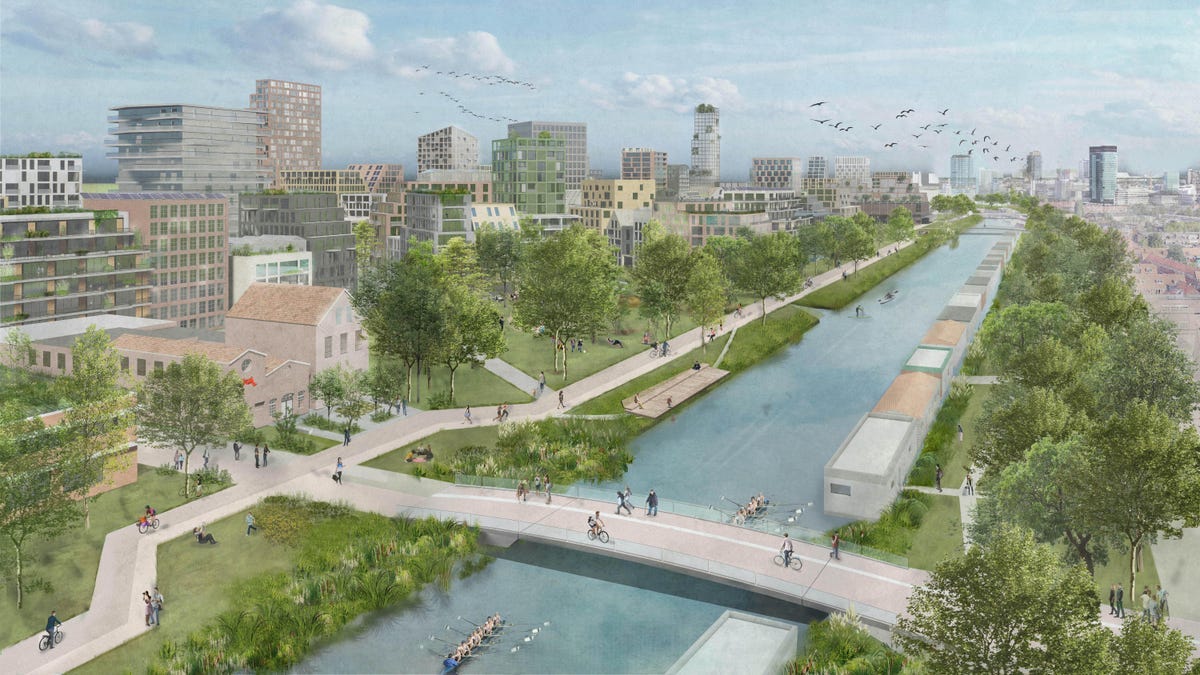I Hate Cars. You Should Too
Don’t get me wrong, I love driving a convertible on a sunny afternoon out on the open road while a light breeze from the ocean whiskers through my hair.
The problem is that 99.9% of the time driving equals sitting in a Cheeto smelling vehicle on a chock full highway, surrounded by concrete and other cars while toxic fumes are entering your air-vents.
To make matters worse, all drivers around you are also frustrated, sleep deprived and could accidentally ram and kill you at any moment!
Did you know that 1.3 million people a year die from car crashes?
That’s more than the entire population of Stockholm, every. single. year! If we include car-accident-related injuries and disabilities, this brings our total up to 50 million per year, or the entire population of South Korea receiving whiplash!
Over a 10-year period, that’s anywhere between 200 - 500 million people injured, or give or take the entire US population!
Not only do cars directly kill people, but they indirectly affect all of us negatively. A fifth of all greenhouse gas emissions in Europe come from cars.
The effect on the local environment is even worse: 30 UK cities are over the limit of what is considered safe air to breathe, and a further 17 are at the limit, leading to one in nineteen deaths being caused by pollution. In Barcelona alone, 3,500 people die each year because of bad air.
You car lovers out there are probably arguing that we should just aim switch to autonomous electrical vehicles, which don’t have emissions and are safer than human drivers.
However, disregarding the enormous cost for both governments and people to make this happen, this doesn’t solve any of the other problems cars can cause in cities. For example, space: In the US, 14% of all space in cities are taken up by car parks, and in Los Angeles, parking occupies more land than housing!

I understand that there are many reasons why someone might feel better driving than taking the bus or subway.
One reason is the speed and convenience your own car can offer. Why wait for a bus that goes an indirect route stopping periodically when you can just drive straight to where you want to go?
For one, increased bus usage means more frequent buses and increased routes to meet demand, so there’s no waiting issue. Secondly, if everyone gets into one bus, there will be virtually no traffic and you’ll just breeze around the city. You can also bypass the road entirely and take a bike lane now built with less than 1% of the cost of maintaining a car-rode.
Some might claim public transport is dirty and helps pass along diseases like the recent Coronavirus. While research shows people who use public transport are more at risk of catching respiratory illness, the same research also shows that areas with more frequent buses and subway services have lower rates of infection because journeys are faster, more direct, and less crowded.
Once again, removing cars will increase the frequency and size of public transport services, alleviating this problem.
Another reason is the perceived cost. Buying a bus ticket at least twice a day every single day might seem like a lot. However, not when you look at the bigger picture. Owning a car in the UK costs an average of £388 ($526) a month due to petrol, repairs, vehicle safety check costs, and insurance premiums. That doesn’t even include parking costs.
All the while, you can’t travel while drunk or high and you are responsible for any accidents that happen behind the wheel.
Accidentally ramming into a toddler on a tricycle because of thick fog? Not only do you have to live with the guilt for the rest of your life, but you’ll also be raped in prison!
Compare this to public transport users. In London, which has the highest public transport cost in Europe, the average commuter only spends £150 per month on transport. Much lower than the average driver, and on nights out they don’t have to nominate some poor sucker in their friends group to be the designated driver.
Won’t banning cars hurt the economy?
This is a resounding NO.
For starters, the 4.5 million dead people that cars cause per year through accidents and air pollution don’t contribute to any business other than undertakers.
When Barcelona banned cars on through-roads in 2013, businesses on these roads reported higher returns and receipts; passersby walked slower, enjoyed their time outside more, browsed in more shops, and bought more things.
The value of these businesses also increased between 10% and 30%, simply by the fact that people were walking next to them rather than driving past. Large open spaces also allow pop-up stands for even more business activities. Food trucks, ice cream vans, street vendors, performing arts, merchandise stalls can all open up shop on areas where most people are walking instead of driving.
What about all the Taxi drivers that will be out of work? We’re going to need a lot more bus, tram, and subway drivers, and construction workers to convert the streets.
Car companies? Some will go out of business for sure, but who wants to support evil corporations like Volkswagen to fuel their next diesel-gate scandal. Also, most car companies, including Ford, GM, Volkswagen, Toyota, Volvo, and Honda have big bus, truck and even train manufacturing units.
Make no mistake, there is a huge shift that needs to happen for car free societies to become viable, but there are plenty of business opportunities to be made, and the effect pedestrianization has on existing businesses have already been shown to be more viable than the alternative.
Clearly, the evidence and arguments are in favor of removing cars from our cities.
But how would we go about doing that?
The answer is simple: DO EVERYTHING IN OUR POWER TO MAKE LIFE A LIVING HELL FOR MOTORISTS.
Hope you have a spare kidney to sell on the black market, because in London, it’s costing you £12 ($16.2) to drive your car inside the city limits, every day! Also, many speed limits are capped at 10km/h for personal vehicles. Have fun being overtaken by the people from the nearby old-folks home…
Want to park your car in a car park? Sorry, there’s a price and a 50% sales tax. On street parking? Doesn’t exist. We’re also adding a ton of bike and bus lanes, meaning car users are now second-class citizens on the road.
When more and more people ditch driving and make the move to public transport, we’ll finally ban cars from inner cities. Of course, people with disabilities will still be allowed to drive and park their cars, as is the case in all places where cars are banned currently, but at a reduced speed.
For those in rural areas, go ahead and keep driving your cars but be warned that we’re also coming after motorways. Motorways, autobahns, and highways are perhaps the least cost effective, most self-destructive form of infrastructure there is. Wonder why there are so many potholes on any given road? Its because cars destroy their own infrastructure faster than anyone can repair them!
Rail travel is less damaging to the environment, looks way nicer, requires way less maintenance, is cheaper than paving over vast swathes of countryside with asphalt, lets you enjoy the stunning scenery, lets you read, work, and talk face-to-face on the way, has no traffic jams, and has barely any noise or air pollution.
In summary
When we shift our municipal psyche away from a culture of cars towards pedestrians and community transport, cities will start to become enjoyable places to live and work instead of just a soulless hub of tarmac. Removing cars and huge swaths of roads in cities equals removing obstacles to economic growth, creating social spaces, increase class mobility and improve overall health, and that can’t ever be bad thing.
Of course, getting rid of cars won’t turn cities into utopias overnight, but it’s a good start.








